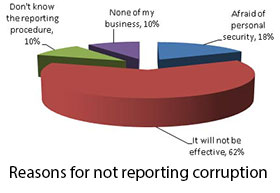Published: 30 June 2015
In spite of having a highly moralistic concept of integrity, some Bangladeshi youth would still resort to unfair means. A TIB study titled National Youth Integrity Survey 2015 found that 98 percent youth ascertain “lack of integrity” as an enormous problem and detrimental to country’s economic and overall development. Also, some 92 percent think that being honest is more important than being rich, while about 68 percent respondents said honest people have a greater possibility to succeed in life than a dishonest people, whereas 32 percent respondents found positive correlation in between corruption and success. On the other hand, a significant portion of surveyed youth admitted that they would like to participate in corrupt acts for their personal gain. For instance, for getting a good grade in a vital job (around 32%), for collecting official documents, permits, license (around 32%), for getting entrance to a good school or a renowned company (around 42%), and most alarmingly to get a dream job (around 49%) a section of the youth are willing to compromise with the principles of integrity. The finding of the study was released through a press conference at TIB office in the capital on 30 June. TIB programme managers (Research and Policy) Manzoor-E-Khoda and Shammi Laila Islam jointly presented the study findings. TIB Trustee Board Chairperson Sultana Kamal and TIB Executive Director Dr Iftekharuzzaman also spoke on the occasion. TIB conducted this survey among 3,656 respondents of which 58% were from rural and 42% from urban areas of 31 districts in the country. These districts were chosen randomly out of 64 and in the second stage 461 mouzas (the lowest administrative unit having a separate jurisdiction list number in revenue records) were selected through random sampling from these districts, proportionate to population density. From each mouza eight (8) households were selected for interviewing target population. In this survey, the age group of 15 to 30 years was considered as youth to maintain the similarities with other countries where this survey has been conducted. However for the purpose of comparison, the survey also included respondents from above-30 age groups.
|
As such, about one–thirds of the sample (1,237 or 33.8%) was drawn from the latter category (above-30 age group) and the rest (2,419 or 66.2%) was from 18-30 years age group. A structured questionnaire prepared by Transparency International was applied to collect the information. The survey was conducted between 22 April and 7 May 2015.Among the youth, 67% respondents are male and 33% are female, with an average age of 22 years. 5% of them are illiterate or can sign only, 8% have formal primary education and the rest 87% of them have secondary education or above. 50% of the youth are students and 5% are jobless. A significant share of youth had experienced corruption in last 12 months while accessing six different regular public services, the study revealed. On an average around 21% of youth experienced corruption in different services. Among them 29% in getting license, permit or clearance, 29% to get rid of police harassments, 25% to get health care from government health facilities, 20% to get a job, 18% to get admission in school or educational institution, and another 17% to get more business experienced different forms of corruption.
According to the survey results, 82% of youth believed that they can play an important role in integrity-building and the fight against corruption through advocacy and changing attitudes
The survey also found that that the trust of youth on public service is fairly low. 86% of youth have negative impression about the level of integrity in politics, followed by law enforcing agencies (66%), land administration (65%) and judicial services (57%). In contrast, 86% of youth have positive impression about the level of integrity in private business sector, followed by private education (81%), government education (80%) and private health services (77%). |
|








